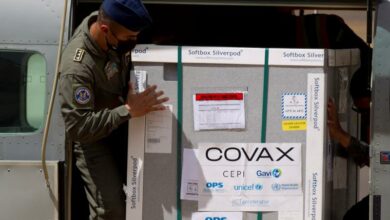Vaccines risk becoming war weapons in chaotic Myanmar

By Paloma Almoguera
Singapore, Jun 9 (EFE).- With less than half of its population vaccinated against Covid-19, Myanmar is in urgent need of vaccines. But conflict and a state of semi-anarchy in the country mean that, even if the doses are procured, they will become a weapon between the army and rebels and fail to reach everyone.
In just over a year, since the Feb. 1, 2021 coup, Myanmar has gone from a country of great promise to a war-torn state cut-off from the international community.
The lack of Covid-19 vaccines in the country is yet another example of dysfunction by the military junta Gen. Min Aung Hlaing leads.
“During the Covid-19 pandemic, the military’s cruelty has had an amplified effect. Covid-19 rages throughout the nation unabated,” National Unity Government (NUG) spokesperson Salai Maung Taing San, also known as Dr. Sasa, told EFE.
Made up of members of the National League for Democracy party of ousted leader Aung San Suu Kyi, which governed between 2015 and 2021, the NUG claims to be the rightful government of Myanmar, where a large part of the population does not recognize the junta and has taken to the streets in protest of the coup.
This situation of conflict has plunged the country into anarchy and led to the collapse of several services, including the health care system.
Doctors have been an integral part of the civil disobedience movement that emerged after the coup.
The military has responded to the movement by arresting over 100 doctors and closing hospitals opposed to the military regime, according to a local NGO.
“Covid-19 has all but disappeared in Myanmar,” said humanitarian sources on grounds of anonymity.
The World Health Organization (WHO) said in a statement to EFE that weekly cases have dropped to double-digit figures but that this data is unreliable due to lack of testing.
Half of the country’s 54 million inhabitants has not yet had access to vaccines, the WHO added.
“The military has weaponized Covid-19, allowing it to kill and maim in hopes of using healthcare as leverage to break people’s resistance,” Dr. Sasa, who is a doctor-turned-politician, said.
People close to him said that the junta is not allowing vaccines to reach the members of his government, its armed wing, the People’s Defense Forces, political prisoners and their families.
Humanitarian sources on the ground, who preferred to remain anonymous, said that many people have chosen to boycott vaccines distributed by the junta either as an expression of their political opposition or because they do not want Chinese doses.
The NUG, which is not officially recognized by any country and is persecuted by the junta, rues that, despite its requests to the UN and other institutions, they have not been included in the process of distribution of vaccines, normally donated through COVAX, a worldwide initiative aimed at equitable access to Covid-19 vaccines.
Asked about this, the United Nations Office for the Coordination of Humanitarian Affairs (UNOCHA) in Myanmar, told EFE that it “engages with all parties to facilitate the delivery of assistance to vulnerable people in humanitarian need especially in conflict-affected rural areas in the northwest and southeast.”
These are the areas to which delivery of vaccines is most difficult due to instability and lack of institutions and where the NUG, which is in contact with the diplomatic community despite not being officially recognized, stands ready to help.
Sources consulted by EFE in Myanmar expressed doubts the current operational capacity of what is described as a shadow government, with many of its members in exile but seeking alliances with groups on the ground such as ethnic minority guerrillas.
Meanwhile, the WHO cites logistical barriers and security as obstacles in vaccine distribution.





